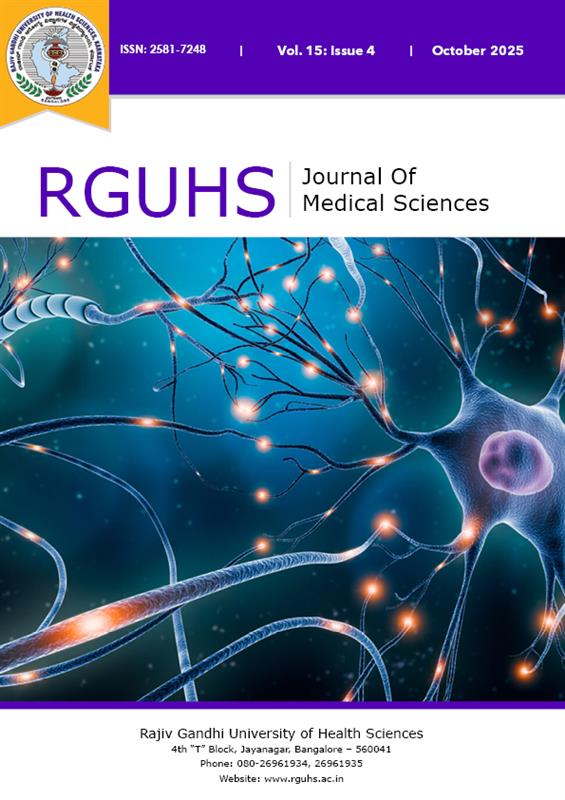
RGUHS Nat. J. Pub. Heal. Sci Vol: 15 Issue: 4 eISSN: pISSN
Dear Authors,
We invite you to watch this comprehensive video guide on the process of submitting your article online. This video will provide you with step-by-step instructions to ensure a smooth and successful submission.
Thank you for your attention and cooperation.
Pranjal Nath1 , Gowda Kavita Umapathy2 , Balaji TG3 , Shashikala P4
1Postgraduate, 2Professor, 3Assistant Professor, 4Professor and Head, Department of Pathology, S. S. Institute of Medical Sciences, Research Centre, Davangere.
Corresponding author:
Dr Gowda Kavita Umapathy, Professor of Pathology, S S Institute of Medical Sciences, Davangere, Karnataka. Email: drgukavita@gmail.com. Affiliated to RGUHS.
Received date: December 4, 2020; Accepted date: February 27, 2021; Published date: March 31, 2021

Abstract
An autopsy was performed on an abortus of 19-20 weeks gestation from a 22-years-old female patient, who showed the presence of cytomegalovirus (CMV) inclusions in most of the organs on histopathological examination. Successful control of the viral infections during pregnancy and in the newborn period is essential in reducing an early and late morbidity and mortality. Hence, subjecting every abortus or intrauterine deaths of foetuses to autopsy and histopathological examination is of prime importance.
Keywords
Downloads
-
1FullTextPDF
Article
Introduction
Human cytomegalovirus (CMV), also known as human herpesvirus 5, is a leading viral cause of congenital infections worldwide and can cause intrauterine deaths. The mean incidence of CMV is 0.64% of all foetuses and/or live births. About 90% of symptomatic infections or infections causing sequelae occur following a primary maternal infection during pregnancy. The overall risk of delivering an infant, who will develop significant handicaps following a primary maternal infection, is between 10% and 15%.1
Case Summary
An abortus of 19-20 weeks gestation from a 22-yearold female patient was received in the Department of Pathology. Abortion was induced, because fetal scan showed multisystem anomalies. The patient also had a history of mentally retarded baby in her previous pregnancy.
Gross appearance
Both the right and left lungs were hypoplastic (Figure1). On cut-section of brain, the left ventricle was dilated.
Histopathology
Sections from cerebral cortex, lateral ventricle, and pons showed prominent blood vessels and presence of large eosinophilic structures in the cytoplasm and nuclei of endothelial cells resembling CMV inclusions.
Sections from cerebellum, thymus, right and left lungs, heart, liver, kidney, adrenal, spleen, and pancreas also showed immature tissues with presence of similar inclusions in the endothelial cells as well as epithelial cells (Figure 2).
Conflict of Interest
None.
Discussion
Human CMV is a double-stranded deoxyribonucleic acid (DNA) virus and is a major cause of disability in children.2 In India, surveys have shown 80%-90% prevalence of CMV immunoglobulin (IgG) antibodies in women of childbearing age.3 Infection may result in neurodevelopmental delay, foetal or neonatal deaths, and sensorineural conductive deafness.5
Universal screening for CMV to identify seronegative women at the beginning of pregnancy could potentially reduce the burden of congenital CMV in one of three ways. The risk of acquiring the infection during pregnancy has been shown to be reduced by institution of simple hygiene measures (primary prevention). Among women who seroconvert during pregnancy, CMV hyperimmune globulin (CMV HIG) shows promise in reducing the risk of perinatal transmission (secondary prevention), and CMV HIG and/or antivirals may be effective in reducing the risk of clinical sequelae among those known to be infected (tertiary prevention). (a) (b) (c) Hence, successful control of viral infections during pregnancy and in the newborn period is essential in reducing an early and late morbidity and mortality.
Conclusion
Early intervention in the form of diagnosis and treatment can reduce or prevent sequelae in most children with congenital CMV infection and proper counseling is required to prevent mother-to-child transmission and to prevent CMV infection in future pregnancies.
This case is reported so that more studies can be done on this topic to augment prevention of maternal infection and thereby, understand the significance of histopathological examination of abortus or dead foetuses.
Supporting File
References
- Rawlinson WD, Hamilton ST, van Zuylen WJ. Update on treatment of cytomegalovirus infection in pregnancy and of the newborn with congenital cytomegalovirus. Curr Opin Infect Dis 2016;29(6):615-24.
- Chakravarti A, Kashyap B, Matlani M. Cytomegalovirus infection: An Indian perspective. Indian J Med Microbiol 2009;27(1):3-11.
- Kumar M, Nizam MB, Mugunathan M. Seroprevalence of cytomegalovirus infection in antenatal women in a Tertiary Care Center in Western India. J Mar Med Soc 2017;19(1):51-4.
- Adler SP. Cytomegalovirus and pregnancy. Curr Opin Obstet Gyn 1992;4(5):670-5.
- Walker SP, Palma-Dias R, Wood EM, Shekleton P, Giles ML. Cytomegalovirus in pregnancy: to screen or not to screen. BMC Pregnancy Childbirth. 2013;13:96.




